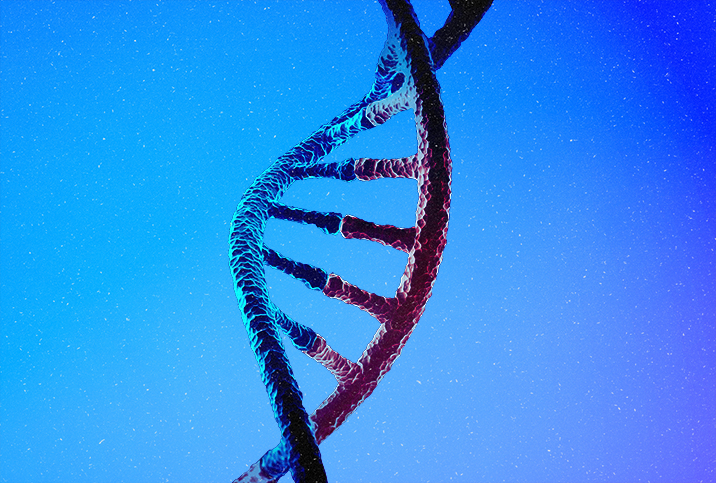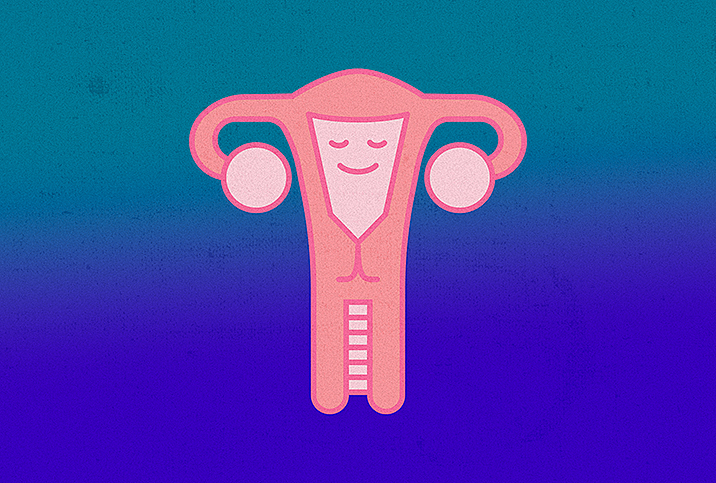Scientists May Have Discovered a Genetic Cause of Endometriosis

Affecting 190 million women worldwide (that's 10 percent of reproductive age women and girls), endometriosis is an underrecognized disease with debilitating symptoms.
Existing endometriosis hormonal treatments and surgeries can come with difficult side effects, and there's no promise the condition won't continuously recur.
However, a new study, published in the journal Science Translational Medicine, has identified a gene called NPSR1 that increases the risk of being diagnosed with endometriosis.
So, what does this mean for the future of endometriosis treatment?
A quick overview of the new research
A research study conducted by the University of Oxford, Baylor College of Medicine, the University of Wisconsin-Madison, and Bayer AG provides new insight into how to tackle the treatment of endometriosis.
The researchers performed genetic analyses of both 32 human families with endometriosis and rhesus macaques, a type of monkey that has periods and can get endometriosis, just like humans. From this genetic analysis, they identified a specific gene, NPSR1, that increases the risk of suffering from endometriosis.
The study included more than 11,000 women, both with and without endometriosis. Most women in the study carrying a specific common variant of the NPSR1 gene had stage III/IV endometriosis.
After identifying the NPSR1 gene, the researchers then used an NPSR1 inhibitor to block protein signaling of that gene in cellular assays, which are used to study cellular mechanisms in live cells. They then repeated the treatment in mice. The NPSR1 inhibitor treatment led to reduced inflammation and abdominal pain.
This has identified a new area for future research, giving hope for a nonhormonal treatment of endometriosis that can potentially alleviate pain for millions of women.
Are all cases of the condition related to the NPSR1 gene?
"This new research study discusses a common genetic link found in 32 families. With genetics, correlation doesn't always prove causation. Not all cases of endometriosis may be related to this genetic mutation," stated Tara Scott, M.D., chief medical officer at the Revitalize Medical Group and medical director of Integrative Medicine at Summa Health Systems.
Krina Zondervan, B.A., MSc, DPhil (OXON), professor of Reproductive & Genomic Epidemiology and co-director of the Endometriosis Care Center, led the Oxford team involved in the research study.
"We found that women with endometriosis more frequently carried variants in the NPSR1 gene than women without endometriosis," stated Zondervan. "That does not mean that all women with endometriosis carry a variant—but it is a 'flag' that tells us that NPSR1 could be involved in endometriosis."
However, there is still more research needed to understand how the NPSR1 gene is connected to endometriosis.
How can treatments evolve with this new knowledge?
"In the study, blocking this gene resulted in pain relief for patients with stage III/IV endometriosis. This is an area that could provide new promising treatments," Scott said.
"We showed that compounds (molecules) that blocked NPSR1 reduced the cellular inflammation response and inflammation/pain related to endometriosis in mice," Zondervan explained.
"We now need to understand more about the biological mechanism of this, and then work on compounds that we could use in women—for this, we would need to conduct clinical trials in future," Zondervan continued. "What is exciting is that this is one of the first nonhormonal treatment targets for the disease that appears to target the inflammation and pain related to endometriosis."
What does this mean for women suffering from the condition?
"This treatment could be an option in the future for women suffering from endometriosis. The treatment referenced in the article may not suppress female hormones, a common side effect of other endometriosis treatments, which often leads to uncomfortable symptoms," Scott said.
The drug used in the study is currently only approved for use in cell and animal experiments, not on humans. Therefore, the next step is to find a drug that can inhibit the NPSR1 gene in humans to see whether it has the same effect on reducing endometriosis symptoms.
"Unfortunately, the road from basic science to a new treatment is long and spans years. But the results open a whole new avenue for the development of nonhormonal treatments," Zondervan concluded.


















